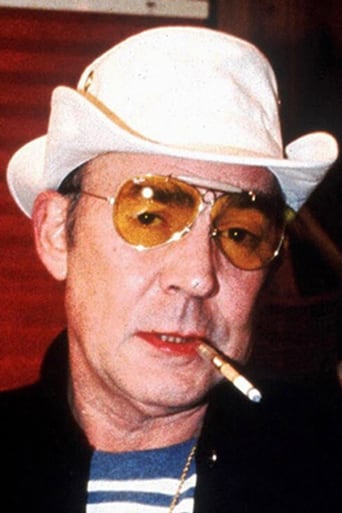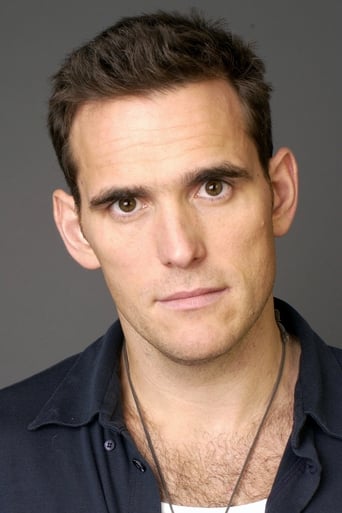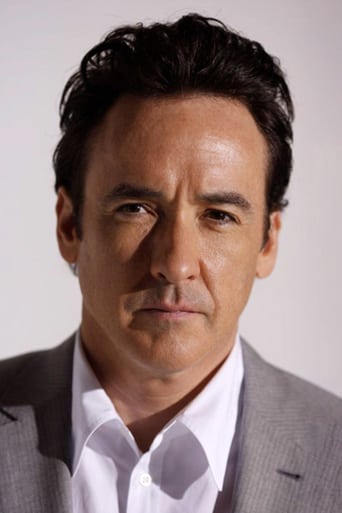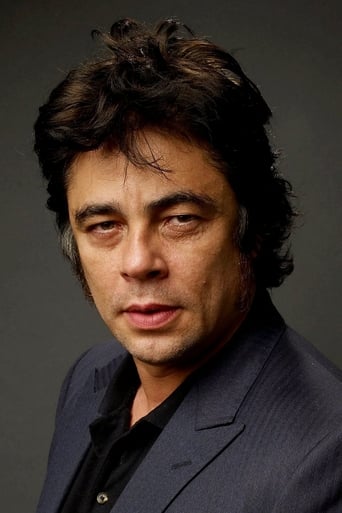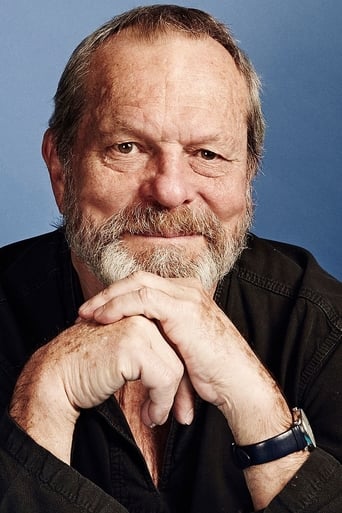SpuffyWeb
Sadly Over-hyped
VeteranLight
I don't have all the words right now but this film is a work of art.
Curapedi
I cannot think of one single thing that I would change about this film. The acting is incomparable, the directing deft, and the writing poignantly brilliant.
Mathilde the Guild
Although I seem to have had higher expectations than I thought, the movie is super entertaining.
MisterWhiplash
It wasn't until I randomly looked on the message board for this fly-on-the-wall documentary, Breakfast with Hunter, that I found out it was available on an internet video site. For the first time ever I watched something longer than a short (it's 90 minutes in running time), and I couldn't get enough. Hunter S. Thompson is one of those rare cases in literature and journalism where fact meets fiction and does a very weird dosey-do into the deranged and brilliant. As a political-type person says on a panel when Hunter visits the old democratic hopefuls from 68 and 72 at a reunion function regarding the book Fear & Loathing On the Campaign Trail, it was "the most accurate AND the least factual." But then again, when you have someone like the good Doctor leading himself through the story- more than the story leading him (though sometimes that too is the case)- who needs solid, objective facts? Thompson's approach is to say 'f*** it', and take out a few guns with some whiskey and have some fun, while never completely losing his head (seemingly anyway).Wayne Ewing's documentary only offers so much of a glimpse of Thompson, at a crucial point during the 96-97 period where Fear & Loathing in Las Vegas- perhaps the pinnacle of his career, if at least his most well-regarded and notorious masterwork- was having it's 25th anniversary, and amid the celebrations and reverence there was still work to be done, and some trouble on the horizon. Ewing sets up a quasi structure then around two things: the pre-production on the film adaptation of Fear & Loathing, and the DUI charge he got brought against him by a not totally honest police officer (albeit Thompson WAS heavily drunk during the drive, but as he writes about it and is read on stage by John Cusack on the doc, the details behind it are gruesomely funny). Sometimes we get some random adulatory type scenes, of Hunter almost in the midst of all of the praise and celebration in either small rooms filled with joy and alcohol (at least one of those anyway) or on a book tour.But the best moments are seeing him at his most candid, and as his nature, sort of sweetly insane. One of those, which I got a big laugh out of, is when he visits an old friend at Rolling Stone magazine, and while intending just to bring flowers, he doesn't hesitate to bring along the fire extinguisher to bring that to him FIRST and then say "but I brought flowers." Or seeing him, as a distinct favor to Johnny Depp, teaching his bird how to talk (truly uproarious, however in poor quality Ewing shot it). Or seeing him with at the time his quasi-protégé Depp, who basically because a version of Hunter, as was his niche to play Raoul Duke in the film, and even went so far as to talk like him, smoke the same cigarettes, and shoot off the same amazing guns. This doesn't totally we mean we don't see Hunter being soft in appearance to the viewer. In fact, one can see the flip-side to the good Doctor's coin, where one side reads bizarre affection and camaraderie with his guests and fellow colleagues and old friends and the like, and the other shows if he doesn't dig you, he can come close to biting. The latter is shown when Alex Cox- the original writer/director of the Fear & Loathing movie before (rightfully) leaving the project- doesn't get that doing a cartoonish version of the book, complete with Raoul Duke actually riding 'the wave' as written in that great piece about San Francisco is totally wrong.What ends up coming out through seeing that, juxtaposed with hearing various pieces of Hunter's writings and hearing and seeing various stories of his form of Gonzo journalism (not to mention his near-win at becoming Sheriff in 1970 in Aspen, shaved head included, as part of the 'Freak Power' ticket), is that Thompson was all about going for craziness and over-the-top ways, but only if it worked for his work. The only one that one can see that can control the world that Thompson has created, both on the page and with the atmosphere of Owl Farm in Aspen, is (or rather was) Thompson himself. Nobody, not the law, or horrid politicians, or misguided filmmakers, can really put a hold on Thompson and his own form of subjective reporting. It's sadder still to see this all after his death, and see how in an ironically quiet way he was really a true force to be reckoned with in American culture, not just with literature. And this documentary, at it's best moments, captures the poetic lunacy of this man, while never getting in the way.
shierfilm
The beauty, grace and majesty of HST shines through in this 90 min. doc.He was a giant among men, and the most striking thing about this intimate look at the Gonzo journalist was how conscious he was of everyone and everything around him. You can't put much past this guy- he was ON. At all times.The sequence where he's discussing the first script for Fear & Loathing the film with Alex Cox and his co-writer was the best example of how pure this guy was. He tells them with sharp, curt truth that he's not impressed with the ideas they have for a landmark passage in the book. They want to create an animated wave with Hunter (a cartoon?) riding it into the desert. He says that idea makes him angry and Mr. Cox acts like a buffoon in response. Firing him was a great footnote in the history of the film- who knows how it would have turned out with Cox at the helm.As a longtime admirer of the Good Doctor's work, it was nice to finally see and hear him. HST has a mythic aura about him, an exotic mystery not unlike Stanley Kubrick. He's larger than life, yet if you pay close attention, you'll see that the man was more than just passionate. You'll see that he's deeply emotional, highly mischievous (but he's never malicious) and that he has high regards for his small company of friends and colleagues.He is missed.
certph
Wayne Ewing's cinema verité portrait of the Doctor of Gonzo Journalism is a keyhole to the everyday life of Hunter S. Thompson. Through years of edited film without any narration or interview from Ewing, this everyday life given to the viewer comes as a bit of a surprise. It is uncommon yet somehow natural. The Thompson I might have predicted is shown throwing a Chivas Regal bottle, spraying people with a fire extinguisher, manhandling blow-up sex dolls, shooting high-powered revolvers, etc. What I didn't expect is the warm interaction between Thompson and his friends. He embraces what might be considered the basket of a flip-flopped American Dream – Hollywood – in his friendships with John Cusack, Johnny Depp, Benicio Del Toro and Terry Gilliam (not, however, Alex Cox). This juxtaposition reveals a prevalent theme in Breakfast, and perhaps in Hunter himself.Thompson suggested in the film a rationale for his rambunctious lifestyle when he said he was 'making literature out of what would otherwise be considered craziness.' This is the crux of the film, and the motivation for Hunter. Though he may be essentially crazy, some of the craziness he exudes is forced. For Thompson, it works. With drugs, alcohol, violence, etc. he causes excitement from what would otherwise just be boring. He creates a palette for which to convey his message. He did this in Fear and Loathing in Las Vegas through his (Raoul Duke) and his attorney's excessive abuse of drugs to help show the degradation of the American Dream. But can this explain the wild-side Thompson portrayed in Ewing's film? Is their some focused ambition behind spraying Jan Wenner with a fire extinguisher? – or soaking Depp, Del Toro and himself in alcohol by sending an opened bottle of scotch freely whirling into the air? Maybe, maybe not. He takes control of any situation with such a crazy gesture, but if it's for some greater good, I don't know. Perhaps Thompson is so high on his own adrenaline that his antics are now focused on sole personal amusement. I like to think this is the case when he laughs off throwing a blow-up sex doll in front of a moving car, or when he mischievously notices an unaccompanied fire extinguisher in a hallway. - -One personal note: something I felt missing from Ewing's portrait was Thompson's intended funeral. A massively-constructed Gonzo fist rifling a bullet containing his remains to explode above the Owl Farm mountains and then cover them like a blanket of rouge on a wrinkled America in such a way that would dwarf the resurrection of Jesus Christ seems to me to say something personal about Hunter S. Thompson.
RayCharlie
Not as insightful as I thought it was going to be. It pretty much covered Hunter S. Thompson's life from 1996-1997. There were a few flashbacks but they weren't very long. I think his race for Sheriff of Aspen should have been covered more. I'm not saying I hated it, but at times it dragged while HST gave meaningless mumbles of insight. At times he p***ed me off (when he wouldn't sign autographs at the book signing and his argument with Alex Cox), but at other times made me laugh and cheer for the outlaw. He's probably my favorite American author but he is sure one hell of an asshole. I guess it's a Kentucky thing lol. I was let down by the fact that it didn't give the viewer what the lifestyle and point of HST is. For that, I suggest reading Kingdom of Fear, which I consider the best piece of reading material I've read in a while. And as mentioned above, his argument with Alex Cox and Tod Davies about putting cartoons in the Fear and Loathing in Las Vegas movie was sometimes unbearable but other times just flat out funny. I like Alex Cox and all, but I sort of agree with Hunter. It was his material and he didn't want it interpreted as a cartoon! Maybe Terry Gilliam was for the better. All in all an average documentary, but did have a noteworthy soundtrack (all songs have been mentioned by Hunter sometime or another) that included "Spirit in the Sky", "American Pie", "The Weight", "Mr. Tambourine Man", and many other. But where was "Sympathy for the Devil?" Worth checking out if you're a fan of HST's work. I don't if it was worth the $29.95, but still a good addition to my HST collection.

